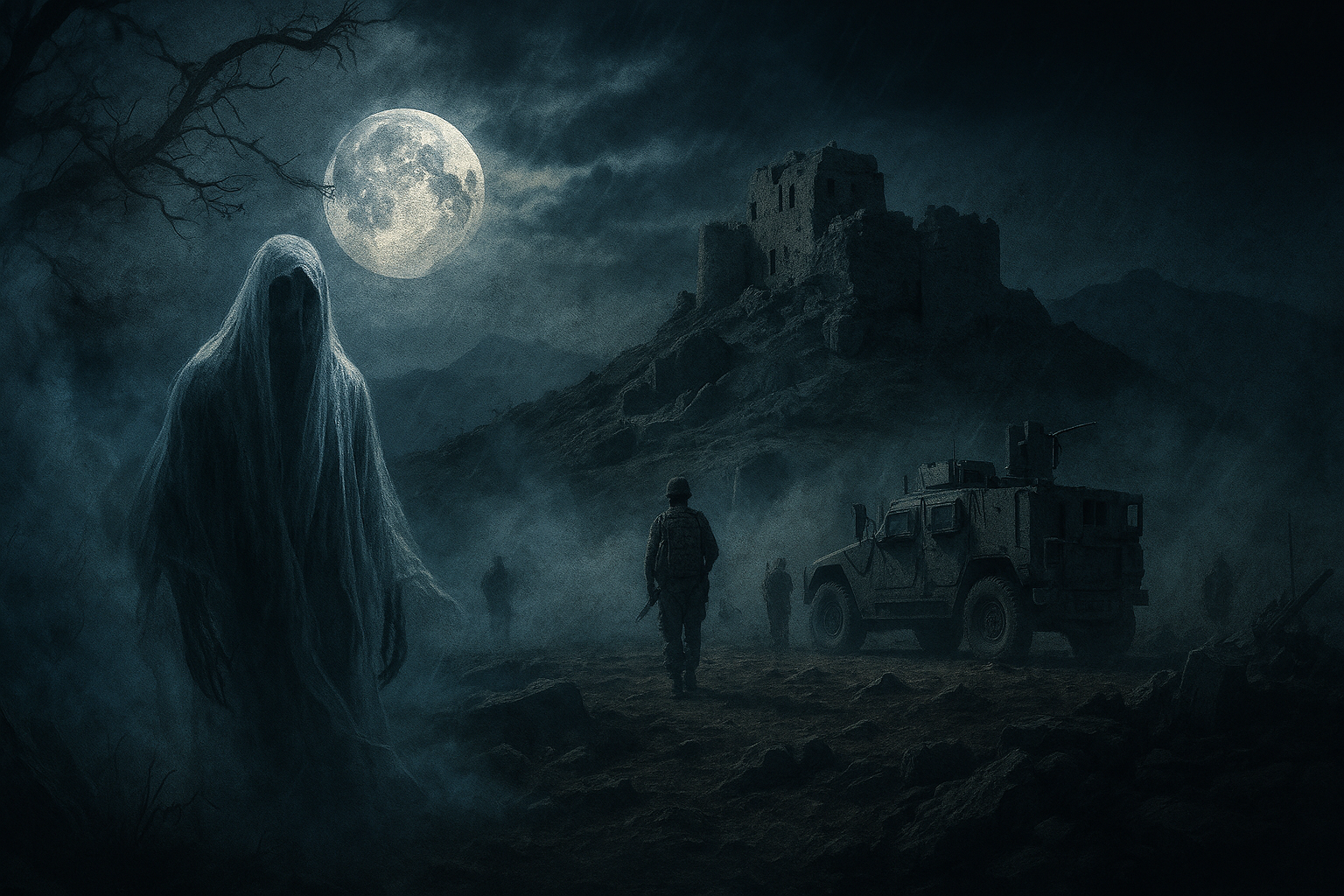In the shadowed valleys of Helmand Province, Afghanistan, lies a place that has become legendary not just for its strategic importance during the Afghan War, but for the chilling stories that emerged from its rocky heights. Known as Observation Point Rock, or simply OP Rock, this remote military outpost has earned a reputation among British and American troops as one of the most haunted locations in the region.
While war zones are often steeped in trauma and mystery, OP Rock stands out for the sheer volume and intensity of paranormal reports—from ghostly apparitions and disembodied voices to unexplained lights and overwhelming feelings of dread. These accounts, shared by soldiers who served during the height of the Afghan War, paint a picture of a place where the veil between the living and the dead seems unusually thin.
A Strategic Outpost in a War-Torn Land
OP Rock was established during the Afghan War, a conflict that began in 2001 following the U.S.-led invasion to dismantle al-Qaeda and remove the Taliban from power. The outpost was located just southeast of Patrol Base Hassan Abad, in the volatile Helmand Province, a region notorious for Taliban activity and intense combat.
British forces, particularly the Welsh Guards, were among the first to occupy OP Rock in the late 2000s. Later, U.S. Marines took over operations in the area. The outpost itself was perched atop a rocky hill, offering a commanding view of the surrounding terrain. Its strategic location made it ideal for surveillance and defense, but it also placed soldiers in a deeply isolated and psychologically taxing environment.
Layers of History Beneath the Sand
What makes OP Rock especially eerie is its ancient foundation. The site wasn’t just a modern military installation; it was built atop ruins believed to be centuries old. Some structures appeared to be remnants of medieval fortifications, possibly dating back to the time of Alexander the Great or earlier. Local lore suggests that the hill had been used as a defensive position for generations, with countless battles fought on its slopes.
Afghan interpreters and villagers often warned soldiers that the land was cursed. Some refused to approach the outpost altogether, citing stories of spirits and unnatural occurrences passed down through generations. The soil beneath OP Rock was said to contain the remains of Taliban fighters, Soviet soldiers, and even ancient warriors, making it a literal graveyard of empires.
Paranormal Reports from the Front Lines
Between 2008 and 2009, a wave of unsettling experiences began to emerge from OP Rock. Soldiers stationed there reported a range of paranormal phenomena that defied explanation:
- Apparitions: Troops described seeing shadowy figures moving through the ruins, sometimes appearing in traditional Afghan garb, other times in military uniforms from bygone eras. These figures would vanish without a trace.
- Unexplained Lights: Flickering lights were seen in areas with no power sources. Some soldiers believed they were lanterns or torches carried by ghostly sentinels.
- Disembodied Voices: Communications equipment picked up whispers and static, often in languages no one could identify. Some claimed to hear their names called out when no one else was nearby.
- Sudden Temperature Drops: Despite the desert heat, soldiers reported abrupt chills, sometimes accompanied by a stench of decay or the sensation of being watched.
- Psychological Distress: Several Marines experienced intense feelings of dread, paranoia, and despair. One soldier described the experience as “scarring for life,” while another said it felt like “the air itself was heavy with death.”
These accounts weren’t isolated. Multiple units reported similar experiences, and some commanding officers began to take the stories, seriously limiting time spent at the outpost and rotating personnel more frequently.
War Trauma or Something More?
Skeptics argue that the paranormal reports from OP Rock can be attributed to combat stress, sleep deprivation, and the psychological toll of warfare. After all, soldiers in active war zones are under constant threat, often operating on little rest and high adrenaline.
But others believe the consistency and intensity of the reports suggest something more. The combination of ancient history, violent conflict, and human suffering may have created a kind of spiritual residue, a haunting that transcends mere hallucination.
Some paranormal researchers have speculated that OP Rock could be a “thin place,” a location where the boundary between the physical world and the spiritual realm is unusually permeable. In such places, emotions, memories, and energies linger long after the events that created them.
A Graveyard of Empires
Afghanistan has long been known as the Graveyard of Empires, and OP Rock embodies that legacy in a deeply visceral way. From ancient warriors to modern soldiers, the hill has witnessed centuries of bloodshed. The land itself seems to remember.
For those who served there, OP Rock is more than just a footnote in military history, it’s a place that left a mark on their souls. Some veterans refuse to speak about their experiences, while others share their stories in hushed tones, as if fearing the spirits might still be listening.
Halloween Reflections: War and the Unknown
As Halloween approaches, the legend of OP Rock serves as a chilling reminder of the unseen forces that linger in places touched by violence and sorrow. It’s a ghost story born not from fiction, but from the haunted memories of those who lived it.
Whether the paranormal events were real or imagined, they reflect the deep psychological impact of war and the mysteries that arise when human suffering intersects with ancient history. OP Rock remains a symbol of both strategic resilience and supernatural unease.
